Are you a dog parent? Whether it’s your first puppy, or you have had dogs since your childhood; you must be curious about some of their funny and odd behaviors. So, we have crowd-sourced the most frequently asked questions about dogs by pet parents and potential pet parents.
Here are the 34 FAQs whose answers you need to know right now.
1. What is the right food for my dog?
The right food for your dog is the one that provides them with complete nourishment and nutrients as per their age, breed, size, and health needs.

There is no “one” perfect brand or type of food for every dog. Speak to our vet at the best veterinary hospital near you or a canine nutritionist to learn more about your dog’s proper diet and food requirements.
2. Why does my dog pee around the house?
It can be a behavior issue or a health issue. There is a good chance that your dog is marking his territory by peeing around the house. It can happen when someone new comes to the house or simply because your dog is in heat. Territory marking is more common among male dogs. However, it does not mean that female dogs cannot or will not engage in territorial behavior.
3. How long should my dog be sleeping?
How long your dog sleeps may depend on their age and overall health. If you have a new puppy, they can sleep anywhere between 16 hours to 20 hours. Never wake a sleeping puppy to play. They need their sleep for proper growth and development. Adult dogs can sleep between 8 hours to 13 hours depending on their breed and energy levels. Senior dogs can sleep for longer especially if they have health issues and are currently taking medication for the same.
4. Does my dog need flea and tick protection around the year?
Absolutely! Yes! Fleas and ticks do not go on summer vacations or winter leaves. Ticks and fleas carry a number of diseases. None of these diseases have a quick fix. To keep your dogs healthy, you need to protect your dog from ticks and fleas throughout the year. Speak to the vet for the best tick and flea treatment for your dog.
5. How often should I bathe my dog?
There is no fixed bathing schedule according to breed. You can consider your dog’s activity level. Do they become dirty often? Are they smelly furballs? You can consider bathing them at least once in two weeks. If you have a dog who lives indoors and doesn’t go out for walks, you can consider bathing them once a month during the winter months.
However, you need to consider regular grooming, dry bathing, and paws/ear cleaning to keep your pet free from infections.
6. Can I use human shampoo on my dog?
Do you use dog shampoo? Then why would you want to use human shampoo on your dog? Our shampoos will strip the natural protective oils from the fur coat of your dog.
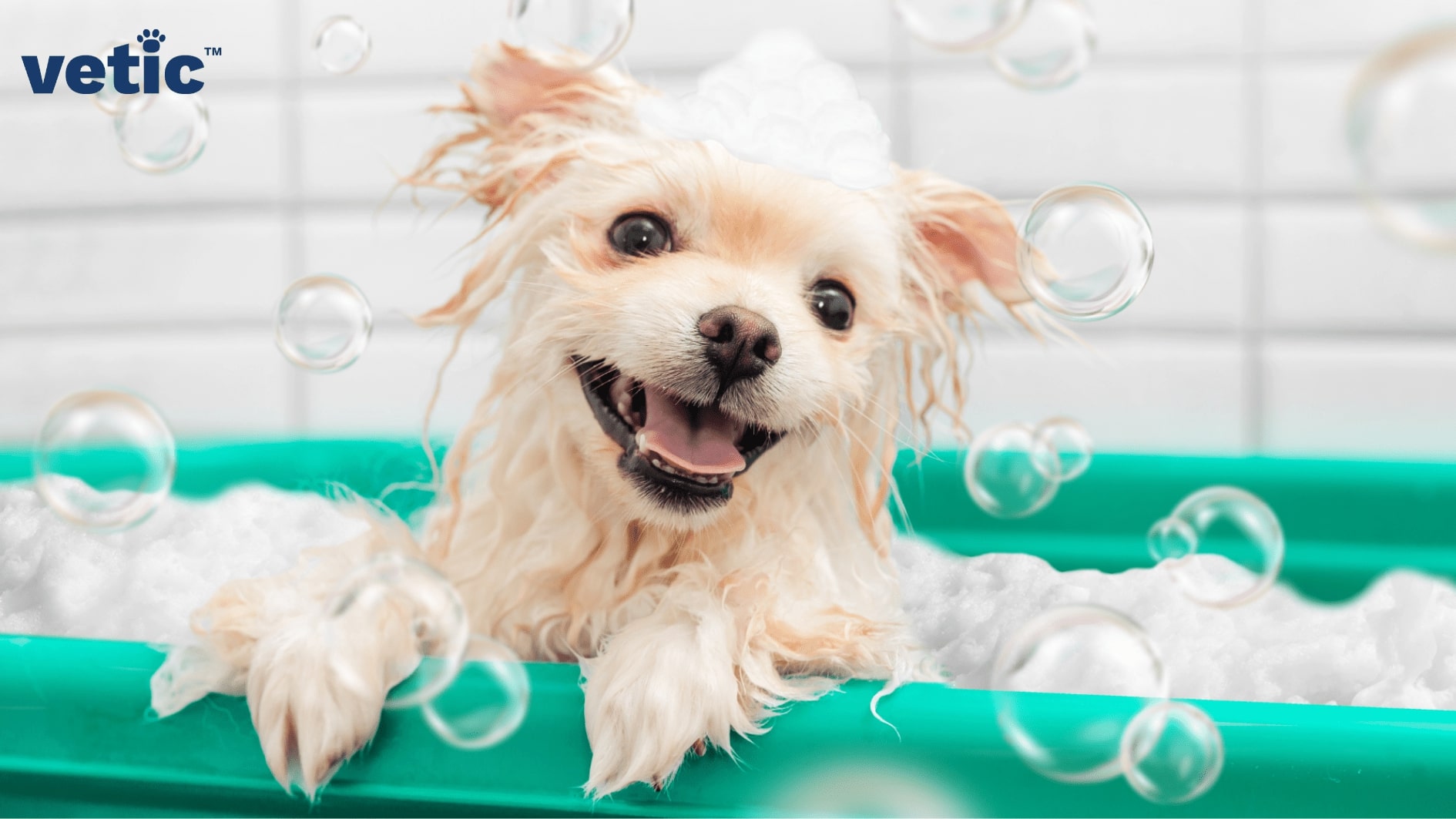
Using store-bought human shampoo will lead to skin problems including dryness, dandruff, and itchiness. Always use dog shampoo for bathing your dog. Consult our groomers or vet to find out exactly what type of shampoo your pooch needs.
7. How many vaccines does my dog need?
During their first year as a puppy, they will need 4 vaccines along with 4 booster doses. In India, your puppy should receive Puppy DP, DHPPiL, Anti-Rabies, Canine Corona, and Kennel Cough vaccines and boosters.
Every year, your dog will need boosters for the DHPPiL, Anti-Rabies, Canine Corona, and Kennel Cough vaccines.
8. How often should I deworm my dog?
The frequency of deworming will depend upon your dog’s age. Your puppy will receive their first dewormer when they are between 28 and 30 days old. Your vet will likely ask you to repeat the dewormer every 14 days until your puppy is 3 months old. When they are between 3 and 6 months old, they will need deworming every month. Once your puppy is older than 6 months, you will have to deworm them once every 3 months.
9. Why is my dog scooting?
Okay! Scooting dogs can be very funny to look at, but they are trying to tell you that something is bothering their tushie. They are scooting to scratch their bum. They may feel itchy due to an overload of worms that is biting or tickling them around their anus. They may also scoot when their anal glands become full or irritated. You should take them to a vet for examination to understand the underlying cause.
10. Does my dog need dental care?
As our dogs have become domesticated, they are dependent on us for healthcare needs including their dental care.
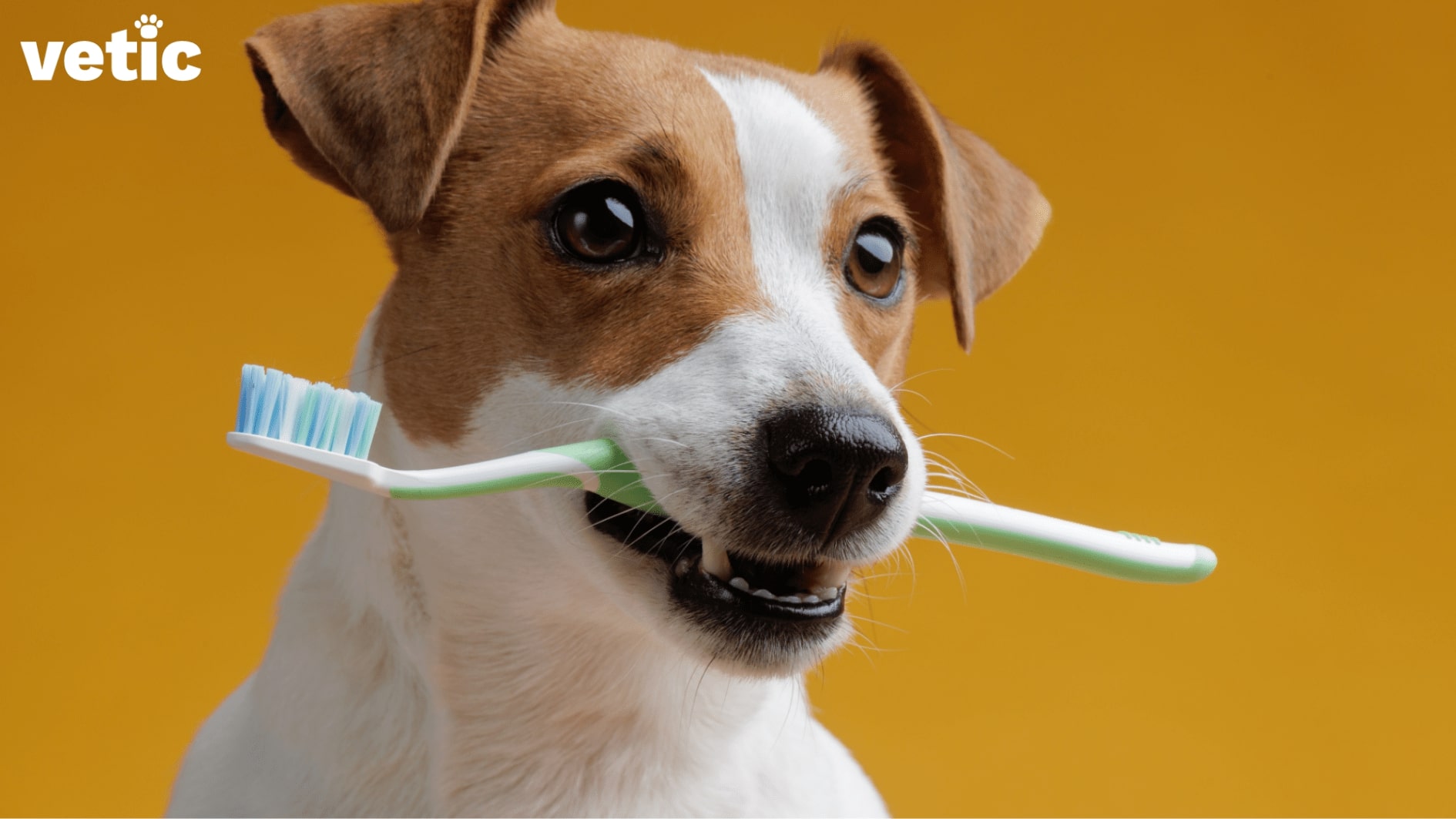
It has become increasingly important to get their teeth cleaned professionally every couple of months unless you can brush their teeth. Without proper cleaning, their teeth will collect food particles that turn into plaque and then tartar or calculus.
11. What is the best boarding option for my dog?
You can leave your dog at a creche or doggy boarding daily while you go to work. Or when you go out of the station. It’s a perfectly good idea since they can learn to socialize while staying there. However, always check the reviews and ratings of the establishment. Speak to the owner workers, and other clients.
Update your dog’s vaccines and boosters at least a month before. Do not forget to give them their tick and flea treatment before dropping them off. If your dog prefers particular food brands and treats, leave them with the person in charge.
Ensure both-way communication after you leave your pooch there. A legit long-term boarding typically has video calling facilities that allow the pet parents to see their fur babies.
12. Can I leave my dog alone in the house for a day?
Is your dog trained to stay alone? Have you ever left him alone for even one hour? If your dog is trained to stay alone and has zero separation anxiety, you can think about leaving them alone for around 6 to 8 hours.
However, we do not recommend leaving any dog, no matter how well-trained they are, at home for an entire day. A lot can go wrong while they are home alone. They may be trained, but you cannot expect them to have the same reasoning and decision-making skills that you do.
13. How will I understand if my dog is sick?
A sick dog may show the following signs –
- Lethargy
- Lack of appetite
- Vomiting
- Diarrhea
- Excessive thirst or complete refusal to drink water
- Temperature above 103 degrees Fahrenheit
- Inability or unwillingness to get up and walk
If you see any of these signs, it’s time to get in touch with the veterinarian. Seek emergency veterinary care near you immediately.
14. How will I understand when my dog has a fever?
One sure-shot way of telling your dog has a fever is by taking their rectal temperature. Any temperature above 103 Degree Fahrenheit is considered fever in dogs.
Not every pet parent can manage taking temperature rectally. So, here are signs that your dog has a fever –
- Lethargy
- Complete loss of appetite
- Glassy eyes
- Sunken eyes
- Dry nose and gums
- Panting
Depending on the underlying cause, your dog may also have a runny nose along with coughing and sneezing.
All of these signs are serious and you should never ignore them. Seek the help of emergency veterinary services near you.
15. Is human food safe for my dog?
Some human foods are safe for your dog. However, there are minute differences between the human digestive system and the canine digestive system.
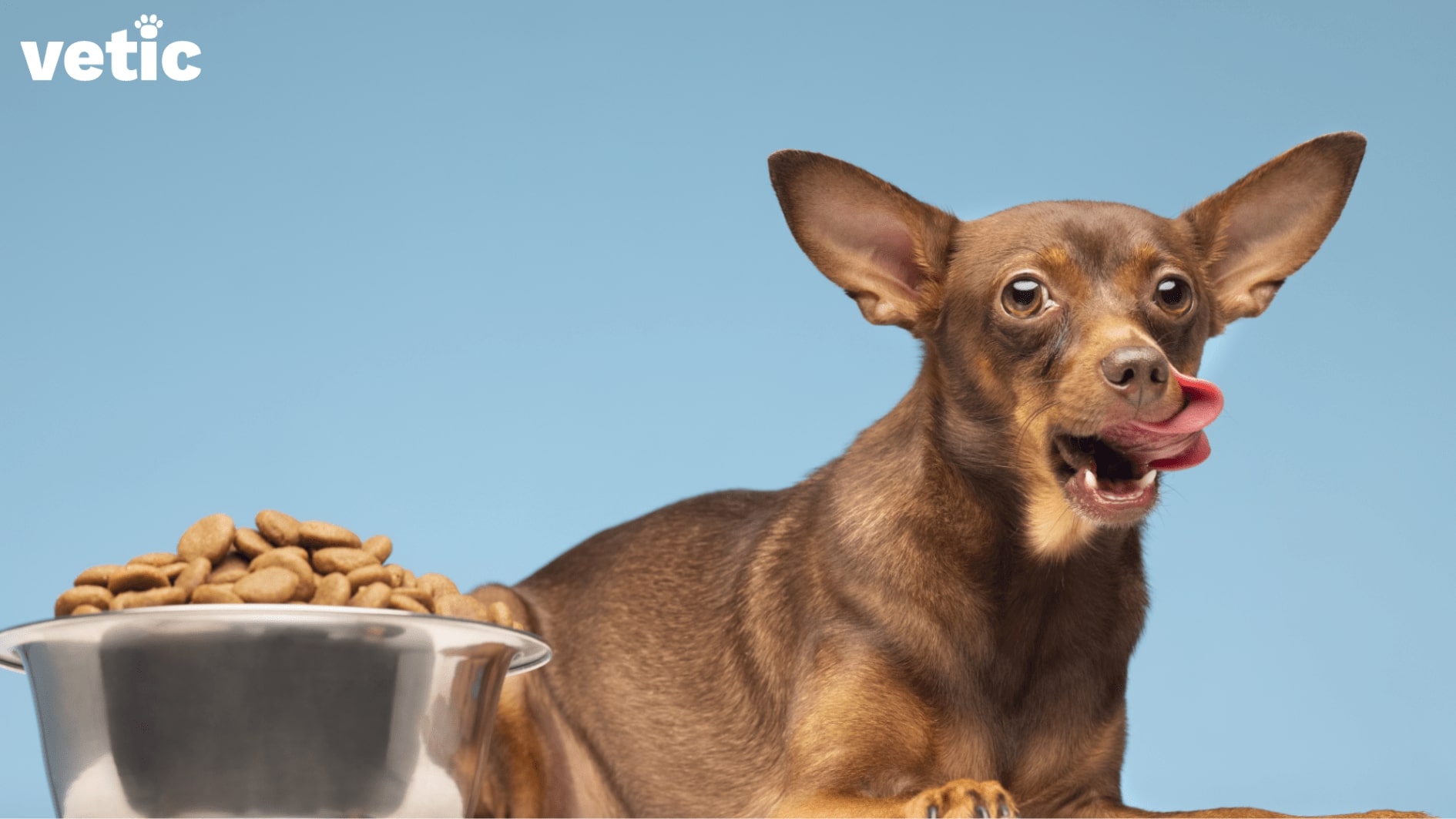
For ages, dogs have evolved with us and they have learned to digest most grains, vegetables, and meats that humans eat. Nonetheless, you should steer clear of feeding excessively starchy and sugary foods to your pooch. Excessive fat (oily foods) can be harmful to your dog.
There is a pretty long list of human foods that dogs should never eat. If you feed human food or home-cooked food to your dogs, keep this list in mind.
16. Is it true that some dog breeds are biters and others aren’t?
Biting and aggression in dogs have very little to do with their breeding and more to do with their training. You can train a rottweiler to be the sweetest companion who plays with your children. And the lack of training and manhandling can push a pug to become aggressive.
If you are planning to get a puppy, speak to the breeder about meeting the pup’s mom and dad. It is a well-known concept – if the pup’s mum and dad are even-tempered you have a high chance of bringing home a pup with a friendly nature.
17. Is it possible to train an adult dog?
“Old dogs don’t learn new tricks” – that’s one proverb you need to throw out of the window. Dogs have the ability to learn and act accordingly at any age. It has nothing to do with their breed or age.
However, you may want to know the reason behind his aggression or misbehavior before you begin training. Some dogs exhibit unpleasant behaviors after enduring years of abuse. In such cases, you will need the help of a canine behaviorist to train your pooch.
In any case, avoid negative reinforcement while training a puppy or adult dog.
18. Can I leave my dog with the children?
Is your dog trained to behave well when you are not around? Have you seen any signs of separation anxiety or aggression in your dog once you leave?
If your dog is anxious by nature, it is never a good idea to leave them unsupervised with children. Accidents including bites are common when dogs are afraid, anxious, and stressed.
19. Why does my dog bite?
It is extremely easy to label a dog “biter.” The real question here is ‘Why is he biting?’ Sometimes, bites happen when unknown people approach a dog. Bite is a result of intense fear, anxiety, and stress that the dog feels. We often mistake the growling, snarling, and baring of teeth as signs of aggression. In reality, these are all forms of communication by the dog that says “I’m not liking this. Back off.” Ignoring these warning signs often results in bites.
In the dog world, even biting is a form of communication. Mothers often nip their pups when they are playing rough. Dogs often get into fights over precious possessions (food, water, mates, and territories).
If your dog is biting, you need to find out what is triggering his bites and avoid them.
20. How and where can I get my pet/dog license?
Depending on your location, you can apply for your Pet Dog Registration Certificate through the Municipal Corporation of Delhi (MCD).
Or, you can apply for the registration of your pet dog through the Saral Portal Pet Registration Online in Gurgaon (Haryana).
21. Can I give human medicines to my dog?
Some human meds are alright for dogs but there are others that can cause irreversible damage to your puppy’s organs. Most importantly, the doses for dog and human meds are completely different.
We do not recommend giving even the most common OTC human meds and supplements to dogs without consulting a veterinarian. If there’s an emergency, take your dog to a 24/7 veterinary care facility.
22. What should I do in case my dog needs emergency healthcare?
- Make a note of all the changes in your dog’s behavior.
- Look for an “emergency 24/7 veterinary clinic near me”.
- Check their reviews and give them a call.
- Take your dog in no matter the time.
23. Is my dog overeating?
Overeating in dogs is often accompanied by –
- Restlessness or extreme lethargy immediately after meals
- Inability to lie down comfortably after eating
- Distended and tight belly
- Panting and excess drooling
- Retching or trying to throw up
If you see these signs in your puppy or dog, bring them to the Vetic 24/7 emergency veterinary care clinic immediately. These signs can precede a bloat or GDV.
24. Is my dog overweight or underweight?
There are breed standards of height and weight for every dog. If your dog is crossbred or a street, it may be difficult to understand if they are overweight or underweight.
You can refer to this chart cum infographic and find their body condition score.
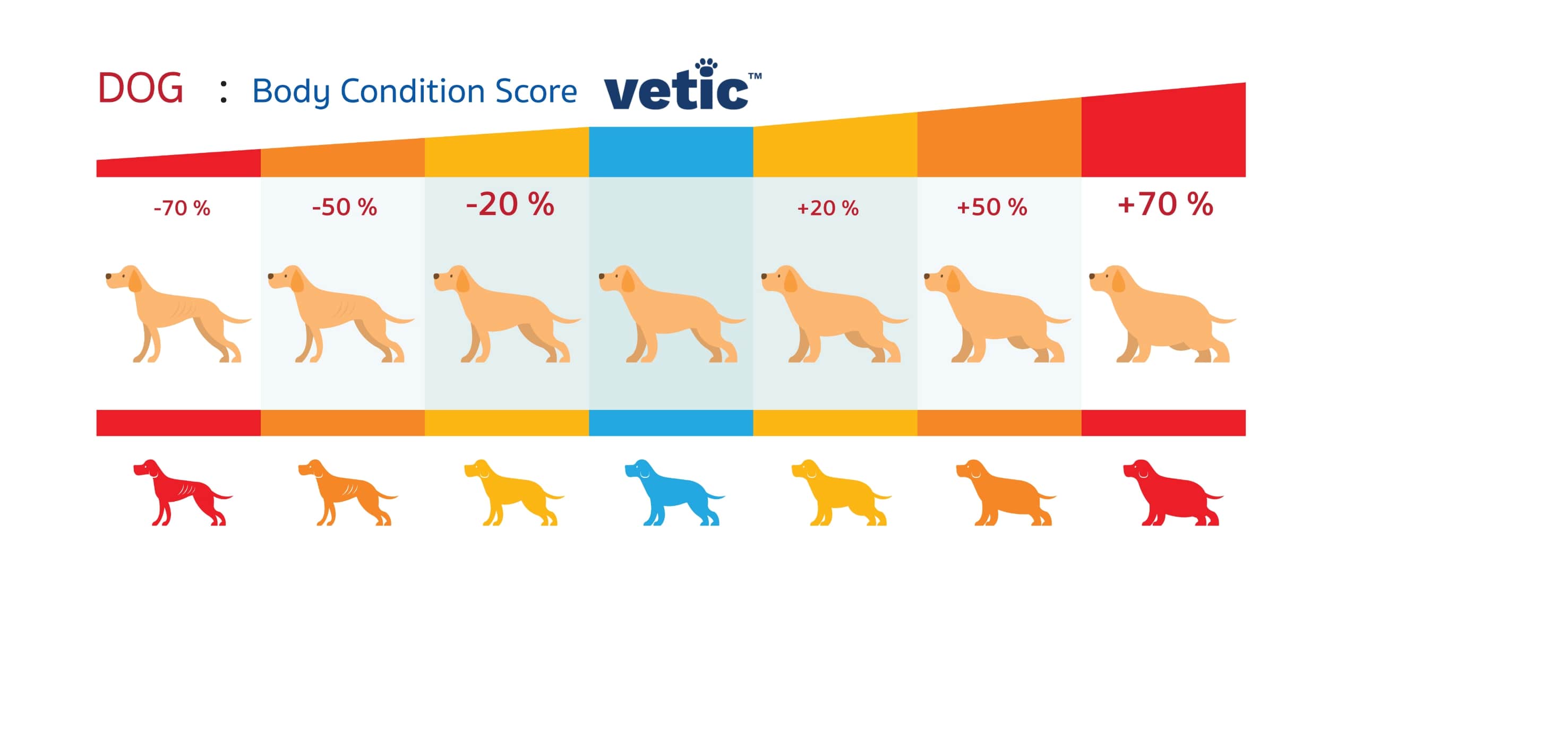
Some breeds like the Greyhound, Whippets, Mudhol Hounds, and Caravan Hounds are lanky by nature. If your dog belongs to these breeds or breeds similar to these, speak to a vet to calm all your worries.
25. Why is my dog eating grass?
Grass-eating is a common and normal behavior among domestic dogs. Dogs need fiber in their diet. The grass is a reliable source of roughage and fiber.
Sometimes, dogs eat particular types of grass to throw up if they are feeling uneasy. At other times, they may eat grass due to an increasing worm load.
Consider all the reasons mentioned above to understand why your dog may be eating grass. While eating grass may not harm your dog, we must remember that grass on the sidewalks isn’t particularly clean. So, do not allow your dog to eat grass when they are out walking with you.
26. Why is my dog chewing on shoes and furniture?
How old is your dog? Are they younger than 6 months? Then they may be chewing on anything and everything because of their teething pain.
Try to leave them treat-filled chewing toys to ease their teething pangs and spare your furniture.
27. Why is my puppy biting my hands and legs? How do I get them to stop?
Puppy biting is common and happens to almost every dog parent. Puppies engage in playing and end up nipping hands and feet since that’s how they play with other puppies and their moms.
It can become quite a menace when they are teething. Try to get them to use their chew toys and do not become their chew toy.

It’s up to you to stop them. If they continue practicing biting on you, it won’t be so cute when they are a year old and play biting with you.
When a puppy keeps biting their mom pulls away and other pups stop playing with them. You need to do exactly that. Once they begin puppy biting, you need to say a stern “No!” without yelling and stop engaging.
28. Why is my dog eating his poop?
Dogs can eat their poop or engage in coprophagy due to multiple reasons –
- Anxiety
- Attention seeking
- Isolation
- Inadequate digestion of food
- Lack of nutrition from available food
If you also notice your dog losing weight, you need to consult a veterinarian. It can be a sign of digestive issues as well as problems with your dog’s diet.
29. Why is my dog shedding so much?
Most dogs shed a lot during the spring. Some breeds shed throughout the year. Nonetheless, if you see clumps of fur around the house and thinning or bald patches on your dog, he may have a skin issue. Consult the veterinarian to know the reason why your dog is losing his fur.
30. Why is my dog scratching?
A little scratching is common in puppies and dogs. However, if you notice your dog scratching his back, ears, and neck excessively, it can be a sign your dog has parasites.
Some of the parasites like ticks and fleas are visible with the naked eye. Mites, on the other hand, require skin scraping and microscopy tests.
Your dog can also be scratching due to allergies.
To find the exact cause, you will need expert veterinary help. Speak to our expert team at Vetic and learn about different ways to find out exactly what is causing your dog to scratch so much.
31. Why do dogs yawn?
We yawn when we are tired. Your dog might yawn when they are tired and ready to sleep as well.
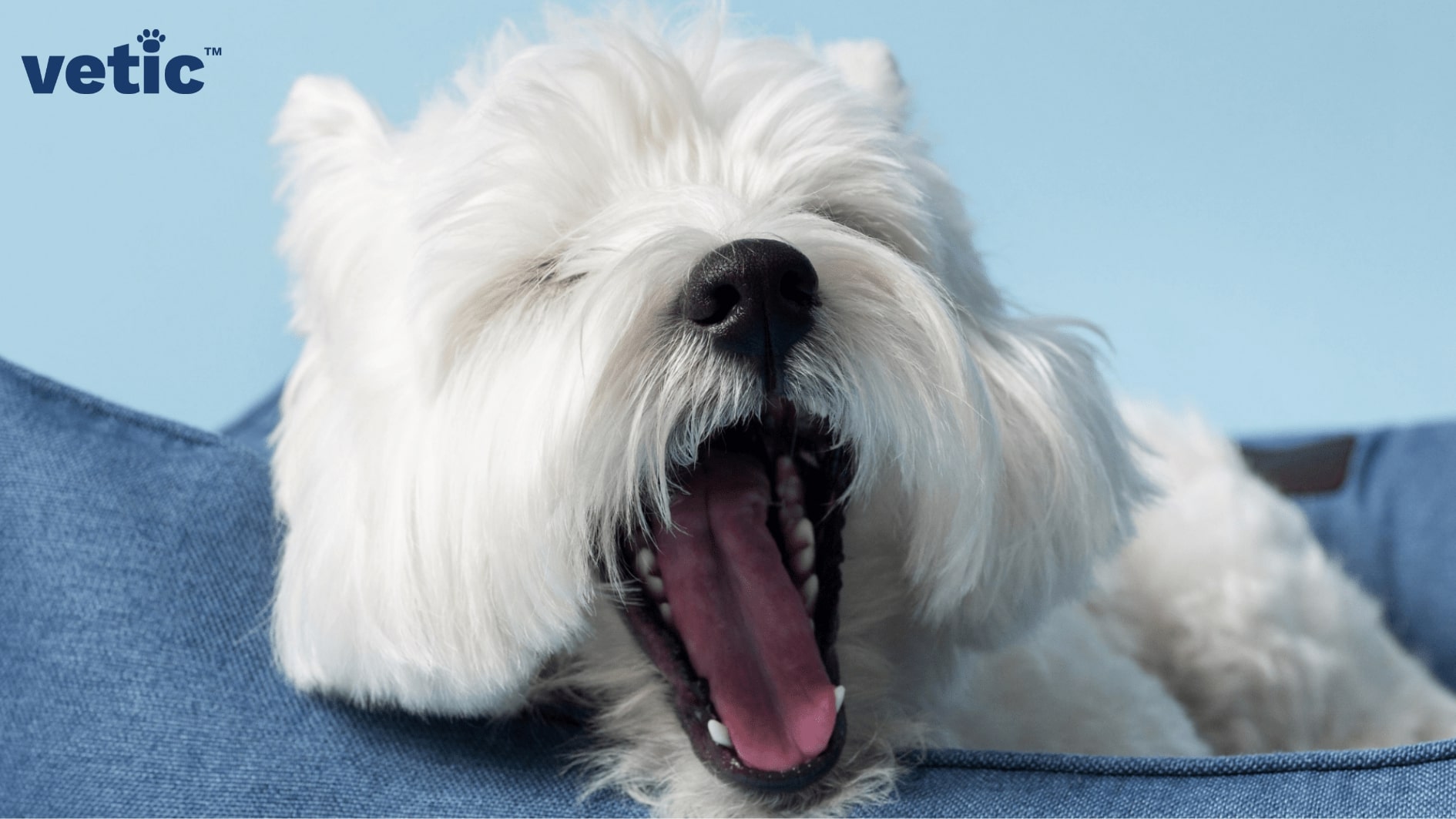
Yawning in dogs is also a sign of stress. When they sense another dog in their area or a person who scares them, they may yawn to display their mental stress.
If you see an unknown dog yawning when you approach them, do not touch them. Leave their personal space and let them be!
32. Why is my dog vomiting/having diarrhea?
Vomiting and diarrhea are signs of distress in almost all animals. The reason may range from simple indigestion to a viral infection.
Instead of trying to treat vomiting and diarrhea in your dog with antiemetics and antacids at home, take them to a vet.
If these begin after 10 pm, look for Vetic 24/7 emergency vet clinic near you. Take them in for examination, tests, and treatment ASAP. These are signs that you should never ignore.
33. Can I give chocolate to my dog?
Absolutely not! Chocolates are treats for humans. If you want to reward your dog for good behavior, please choose dog treats.
Chocolates are toxic for dogs. They contain theobromine which can lead to severe organ damage.
34. How frequently should I take my dog for vet check-ups?
As a puppy, your dog will probably go in almost every month and sometimes, more than once a month for vet check-ups thanks to their vaccines. Once they are a year old, you should take your dog in at least 3-times for their vaccines and once for complete health evaluations. Book your appointment with Vetic, if you have missed a vaccine or check-up.

